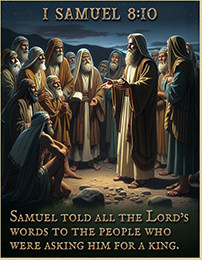1 Samuel 8:1–22 . . . Bible Study Summary with Videos and Questions
“Give Us a King to Lead Us”
Early in 1 Samuel, the Israelites thought they'd benefit from using the ark of God as a good-luck charm instead of appreciating it as a sacred object. After suffering defeat at the hands of the Philistines, the Israelites brought out the ark and took it into battle with them (see our summary of 1 Sam. 4:1–22), hoping it would bring them victory. As we know, it didn't. Now in chapter 8, it's not the ark but a king in whom the Israelites will place their trust and hope. This chapter marks ancient Israel's transition from judgeship to kingship. The Israelites’ desire for a king is but another event in their long history of looking for a source of benefits outside of God and his kingdom. Let's focus on critical changes that this chapter presents in its account of Israel’s history, documenting how slow Israel was to learn.
Chapter 8 is divided into two parts. In vv. 1–5, we'll see Samuel make his two sons "judges over Israel" in his golden years; sadly, his sons won't walk in his ways; the Israelites will then demand their own king. In vv. 6–22, Samuel resists their plea for a king; he prays for guidance; the Lord tells him, listen to the people but warn them that a king would take away their sons for military endeavors; the king would also take the best for himself, including numerous tithes, ultimately making the people become the king's slaves; ironically, the people will cry out even more for their own king.
“We Want a King!” (8:1–5)
[Note: Click the link to This Week's Passage near the bottom of this page to read today's Scripture.] Much of Samuel’s life and ministry was passed over until chapter 8. The Israelites in Canaan had lived in separate territories, not within a united Israel. In v. 1, we find Samuel as a man getting up in his years, perhaps getting ready to retire. He'll appoint his two sons, Joel and Abijah, as judges for Israel, stationed in the frontier town of Beersheba. The people probably wouldn't have pressed for a king at this time had Samuel's sons proven to be as faithful to the Mosaic Covenant as their father had been. Samuel wasn't only gifted as a priest and judge, he was also a prophet. Apparently, God hadn't so gifted Samuel's two sons (nor Eli's sons). It became obvious to Samuel that both had become corrupt, however, nothing more is said of their corruption or ministry. Over all, both sons weren't godly men like their father; neither did they follow nor “walk in his ways” (v. 3).
All of Israel's elders collectively told Samuel that, because he was old and that his sons weren't following his way, their nation required a king (v. 4). Their proposed solution was foolish. The folly of their logic sounded like this: Samuel, you're getting old, and your sons who'll replace you are corrupt. We can't have a bright future if our leaders are corrupt. Let’s create a new order with a king like other nations. Let him judge us within his dynasty, so that the king's son will rule in his place after his death, for generations to come.
It was God who raised judges, yet God was excluded from the elders' purposed proposal. He didn't create a dynasty of judges in which their sons replaced them. Seeing Samuel’s sons as corrupt, they could have been set aside by the elders, as they were. But to propose a dynasty amounted to calling for a system in which the king’s sons would rule in succession, whether they were wicked or righteous. That couldn't be a cure! They simply wanted a king — without God's presence and influence — to become their judge, rather than having judges who acted as Samuel had done. They weren't trying to fire Samuel as their judge; they sought to fire God as their King.
The Reason for Requesting a King (vv. 6–9)
6But when they said, “Give us a king to lead us,” this displeased Samuel; so he prayed to the Lord. 7And the Lord told him: “Listen to all that the people are saying to you; it is not you they have rejected, but they have rejected me as their king. 8As they have done from the day I brought them up out of Egypt until this day, forsaking me and serving other gods, so they are doing to you. 9Now listen to them; but warn them solemnly and let them know what the king who will reign over them will claim as his rights” (1 Sam. 8:6–9).
Look closely at the reason for demanding a king. God had made provision for kings to rule his people in the Mosaic Law (Deut. 17:14– cf. Gen. 1:26– 17:6, 16; 35:11; 49:10). The request in itself wasn't what displeased Samuel and God. Note: The request had come from "all the elders of Israel" (v. 4). God likely realized it this way: "Elsewhere a king was god, but in Israel, God was to be King." However, the elders' request expressed a desire to be "like all nations." But God's purpose for Israel was that it be different from all nations, superior to them, and be a lesson for them (Exodus 19:5–6). God saw their demand as one more instance of Israelite apostasy that prevailed since the Exodus (cf. Numbers 14:11). He acceded to their request, as he'd done many times before (by providing manna, quail, and water in the wilderness). However, he combined judgment with his grace, then and today.
Samuel wasn't at all pleased with the elders’ proposal. While it's true that they were seeking his replacement, the text tells us that this proposed change “displeased Samuel.” Simply put, Samuel knew that their request was wrong and that it was sinful. His response further confirmed his godly character: He didn't rebuke the elders, shaming them with his disapproval and anger; he went to God in prayer, as he was inclined to do. God’s response to Samuel’s prayer confirmed Samuel’s assessment of the situation. God informed him that, ultimately, it was he, not Samuel, whom they were rejecting.
Remember: God had become Israel’s King (capital "K") at the exodus. In v. 8, God reminded Samuel that Israel’s current rejection of him wasn't something new; it was one more instance in a constant succession of rejections, since the exodus. Their rejection of God as King, while asking for a king “such as all the nations have,” is nothing less than idolatry. The king they wanted was to become their “god.” Having exposed the roots of their worldly proposal, God then instructed Samuel to listen to the people and accept their demand for a king. Although Samuel was to grant the people's request, he was also to advise them of what the king "who will reign over them will claim as his rights” (v. 9b).
The Consequences of Requesting a King (vv. 10–18)
In v. 10, Samuel “told all the words of the LORD to the people who were asking him for a king.” Thus, he told the people what God had told him in vv. 7–9, and perhaps other words that God spoke that aren't recorded in our text. But the author wanted us to focus on words recorded in vv. 10–18, which appear to be a very significant part of Samuel’s message to the Israelites who demanded a king. He explained to them what it would mean for them to have a king similar to others. The elders were interested in the functions of monarchy, but Samuel pointed out the nature of monarchy. It meant a loss of freedoms and possessions that people presently enjoyed. In vv. 11–17, Samuel didn't define the rights of a king. Instead he described the ways of most kings. Note the recurrence of the words "take" (seven times) and "best" (twice) in the NIV.
Another consequence of kingship was financial cost. What the Israelites were demanding was very costly. To have a king who'd lead them to war required a standing army. Being ruled by a king, life on farms would be different. The king would draft Israel's sons into military service; they'd drive his chariots or serve as horsemen or infantry soldiers, with some being drafted as officers. A standing army also needed supplies. Israelite sons would have to plant and harvest crops and build and maintain military equipment and the requisite non-military supplies. And it wouldn't be only young men whom the king would draft into his service; the Israelites’ daughters, who once sat or served at their fathers’ table, would be required to serve at the king’s table as perfumers, cooks, bakers, etc.
But the price tag would become even larger. The king and his courts would consume a large quantity of very fine food. To afford that rich cuisine, the king would have to assess a tax on all growth. Their best grain would go to the king, along with the finest of their vineyards, groves, and pastures. A good portion of those fine things that an Israelite farm family once enjoyed would be consumed by the king’s servants. A tenth of farmers' seed and vines would be have to be collected to enable the king’s servants to plant their fields (on land the king would take from the people).
Add to that the high cost of a king needing staff to serve him. So he'd take the best of Israel's male and female servants. Also, the king would require livestock, and donkeys to plow the king’s fields, all of which the people would have to supply. In short, when the people's king is crowned, he'd rule heavily over them. People who'd enjoyed freedom would soon become the king's slaves. Once they'd finally realize what they'd gotten themselves into, it would be too late to change anything. The Israelites would one day cry out to God to relieve them of the oppression of their own king, but God wouldn't want to hear their outcries, since they'd agreed with wide-open eyes to become their king's slaves.
God Meets Israel’s Demand (vv. 19–22)
19But the people refused to listen to Samuel. “No!” they said. “We want a king over us. 20Then we will be like all the other nations, with a king to lead us and to go out before us and fight our battles.”
21When Samuel heard all that the people said, he repeated it before the Lord. 22The Lord answered, “Listen to them and give them a king” (1 Sam. 8:19–22).
Israel wanted a king. But Samuel warned that they'd pay dearly if they obtained a big government. Excess cost didn't matter to the people or their elders; they were determined to have their own king; they refused to listen to Samuel. Neither did they heed his warnings; they insisted on having a king who'd judge them and go before them in battle, a king to do their judging and their fighting.
Samuel listened to and appreciated all that the people had to say. He then went to the LORD, repeating all that they'd said to him (v. 21), which I find very interesting. We shouldn't be at all surprised to read that Samuel went to the people, telling them everything that the LORD had said to him (v. 10). But why did Samuel feel it necessary to re-tell the LORD all that the people had said to him? Quite likely, it's because Samuel, just like us, needed to talk, commune, and pray with God. We aren't to pray in order to inform him of things; instead, we pray to God because we need him in our life. We must be hearty in how we pray, sharing our burdens and concerns with him. Samuel told God everything the people had said, not because God needed to be informed, but because Samuel [and us] felt the need to become more personally intimate with God.
In answer to Samuel’s prayer, God once again instructed him to give the people what they demanded. And so, not knowing who this king would be, Samuel sent the Israelites to their homes till God indicated the identity of their new king (v. 22).
† Summary of 1 Samuel 8:1–22
This passage recounts a pivotal moment in Israel’s history when Samuel, now old, appoints his sons, Joel and Abijah, as judges. However, unlike Samuel, they prove corrupt, accepting bribes and perverting justice (8:1–3). Concerned about the future leadership, the elders of Israel gather and approach Samuel with a request for a king “ judge us like all the nations” (vv. 4–5). This request greatly displeases Samuel because it signifies a rejection not just of his leadership, but of God as their true King (vv. 6–7).
Samuel takes the matter to the Lord, who instructs him to heed the people’s demand, though God warns through Samuel about the consequences of human monarchy. Samuel warns Israel that a king will draft their sons for his armies, take their daughters for service, seize the best of their fields, vineyards, and produce, and ultimately use them like servants (vv. 10–18). Despite the warnings, the people insist, desiring to be like other nations with a centralized king to lead and fight for them (vv. 19–22). God commands Samuel to appoint a king, marking a significant transition from the period of judges to the establishment of Israel’s monarchy.
Key points with verse references:
• Samuel’s sons are corrupt judges, unlike their father (vv. 1–3).
• Elders of Israel request a king to lead them like other nations (vv. 4–5).
• God reveals that the people are rejecting him as their King by asking for a human king (vv. 6–7).
• Samuel warns the people of the harsh realities of monarchy, including conscription and taxation (vv. 10–18).
• Despite warnings, the people insist on having a king, and God instructs Samuel to grant their request (vv. 19–22).
This Week's Passage
1 Samuel 8:1–22
New International Version (NIV) [View it in a different version by clicking here; also listen to chapter 8 narrated by Max McLean].
† Summary Video: “The First Book of Samuel”
† Watch this introductory video clip created by BibleProject on bibleproject.com.
- Q. 1 Why was rejecting Samuel the same as rejecting God (v. 7)?
- Q. 2 Why does the Lord seem to give in to the Israelites (v. 22)?



